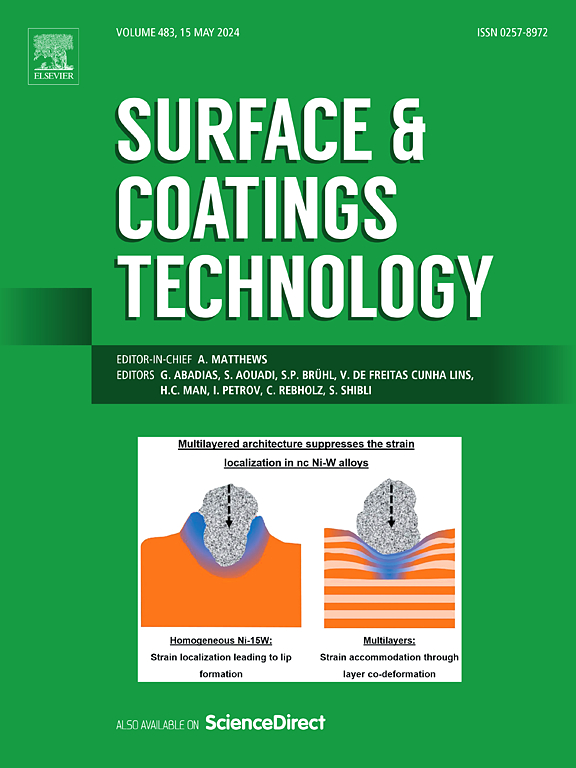超声波表面滚压强化 Ti6Al4V 合金异常硬化行为的定量机制
IF 5.3
2区 材料科学
Q1 MATERIALS SCIENCE, COATINGS & FILMS
引用次数: 0
摘要
一般来说,金属材料在经过表面机械强化后,最外层区域的硬度最高。然而,在这项工作中,Ti6Al4V 合金在经过超声波表面滚压工艺(USRP)后出现了异常的表面硬化行为。表面硬化程度最高的区域不在顶面,而是在次表面。通过分析表面不同深度的晶粒大小、位错密度、纹理和核平均错向(KAM)分布,并将这些发现与有限元分析(FEA)相结合,阐明了这种异常表面硬化的微观结构演变。微结构表征和有限元分析结果表明,次表层区域发生了最显著的变形。随后,通过应用理论分析,首次定量描述了 USRP 处理异常硬化的潜在机制。结果表明,晶粒细化导致的硬化效应并不明显,而位错堆积导致的硬化效应则更为普遍。在 USRP 样品的次表层区域,大量的界面导致该区域位错堆积最多。因此,次表层区域的显微硬度最高,导致了异常的表面硬化现象。本文章由计算机程序翻译,如有差异,请以英文原文为准。
Quantitative mechanism of abnormal hardening behavior of Ti6Al4V alloy strengthened by ultrasonic surface rolling
In general, the outermost region of a metallic material has the highest hardness after surface mechanical strengthening. However, an abnormal surface hardening behavior was observed in Ti6Al4V alloy after the ultrasonic surface rolling process (USRP) in this work. The region with the highest surface hardening was not at the top surface but at the subsurface. By analyzing the distribution of grain size, dislocation density, texture, and kernel average misorientation (KAM) at different depths from the surface, and combining these findings with finite element analysis (FEA), the microstructural evolution underlying this abnormal surface hardening was elucidated. The microstructural characterization and FEA results indicate that the subsurface region underwent the most significant deformation. Subsequently, through the application of theoretical analysis, the potential mechanism of abnormal hardening of USRP treatment is described quantitatively for the first time. The results demonstrated that the hardening effect resulting from grain refinement was less pronounced, whereas the hardening effect resulting from dislocation pile-up was more prevalent. At the subsurface region of the USRP sample, a large number of interfaces resulted in the highest accumulation of dislocations in this area. Consequently, the subsurface region exhibited the highest microhardness, leading to the abnormal surface hardening phenomenon.
求助全文
通过发布文献求助,成功后即可免费获取论文全文。
去求助
来源期刊

Surface & Coatings Technology
工程技术-材料科学:膜
CiteScore
10.00
自引率
11.10%
发文量
921
审稿时长
19 days
期刊介绍:
Surface and Coatings Technology is an international archival journal publishing scientific papers on significant developments in surface and interface engineering to modify and improve the surface properties of materials for protection in demanding contact conditions or aggressive environments, or for enhanced functional performance. Contributions range from original scientific articles concerned with fundamental and applied aspects of research or direct applications of metallic, inorganic, organic and composite coatings, to invited reviews of current technology in specific areas. Papers submitted to this journal are expected to be in line with the following aspects in processes, and properties/performance:
A. Processes: Physical and chemical vapour deposition techniques, thermal and plasma spraying, surface modification by directed energy techniques such as ion, electron and laser beams, thermo-chemical treatment, wet chemical and electrochemical processes such as plating, sol-gel coating, anodization, plasma electrolytic oxidation, etc., but excluding painting.
B. Properties/performance: friction performance, wear resistance (e.g., abrasion, erosion, fretting, etc), corrosion and oxidation resistance, thermal protection, diffusion resistance, hydrophilicity/hydrophobicity, and properties relevant to smart materials behaviour and enhanced multifunctional performance for environmental, energy and medical applications, but excluding device aspects.
 求助内容:
求助内容: 应助结果提醒方式:
应助结果提醒方式:


